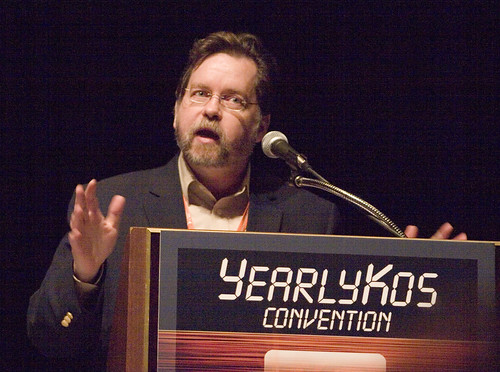UD moderator Clive Hayden referred UD readers to an article at SuperScholar.org titled “The Future of Secular Humanism.” The article itself focused on a rift between the secular humanism old guard, represented by Paul Kurtz, and the new guard, represented by Ron Lindsay, who apparently ousted Kurtz from the various humanist organizations he had founded. The rift was over the place of religion in society and whether secular humanism should take a harsh line against it.
Hayden sees this rift as representing a deep-seated internecine conflict, with the implication that such conflict will undercut the effectiveness of secular humanism as a cultural force (though he doesn’t draw that implication explicitly). My own view is that secular humanism is being co-opted by the new atheism and that Kurtz’s humanist vision is on the way out.
 I’ve been party to at least two debates that Kurtz organized and have met him personally. He’s a gentleman and sees civility as a prerequisite to free and open discussion. As a humanist, he values humanity. The problem is that he views religion as irrational and counterproductive to society, so it’s hard to justify civility vis-a-vis religion (is it possible to have a civil discussion with a holocaust denier?). And without religion, it’s hard to justify a high view of humanity — humans, in that case, become merely evolved animals.
I’ve been party to at least two debates that Kurtz organized and have met him personally. He’s a gentleman and sees civility as a prerequisite to free and open discussion. As a humanist, he values humanity. The problem is that he views religion as irrational and counterproductive to society, so it’s hard to justify civility vis-a-vis religion (is it possible to have a civil discussion with a holocaust denier?). And without religion, it’s hard to justify a high view of humanity — humans, in that case, become merely evolved animals.
 And so, Kurtz, who’s in his 80s, passes the baton to his spiritual son … PZ Myers, who’s a generation younger and in a better position to follow out the logic of Kurtz’s vision. Actually, I could have chosen any number of younger humanists/atheists, but Myers is emblematic of what we are seeing and can expect to see. Instead of Kurtz, who established Prometheus Press to get a fully articulated secular humanist vision before the public, Myers has the blog Pharyngula, in which he trades in sound-bites and insults.
And so, Kurtz, who’s in his 80s, passes the baton to his spiritual son … PZ Myers, who’s a generation younger and in a better position to follow out the logic of Kurtz’s vision. Actually, I could have chosen any number of younger humanists/atheists, but Myers is emblematic of what we are seeing and can expect to see. Instead of Kurtz, who established Prometheus Press to get a fully articulated secular humanist vision before the public, Myers has the blog Pharyngula, in which he trades in sound-bites and insults.
In a Facebook/Twitter culture where people’s attention span is down to zero, Myers’ blog represents the new face of secular humanism, or perhaps I should say the new atheism. Indeed, I have to wonder how long the phrase “secular humanism” will be around. If it stays, it will be through inertia, because the new generation of humanists/atheists divides humanity into us and them — the enlightened vs. the idiots — and despises the outsiders. They take pleasure in hatred. Paul Kurtz didn’t.
By the way, here are the YouTube videos referred to on the SuperScholar.org site in which Kurtz is lectured on why he was shown the door. It’s not often that we see the other side’s dirty laundary (or our own side’s, for that matter). It’s 20 minutes and some of it requires wading through, but it has some high points and is quite instructive: